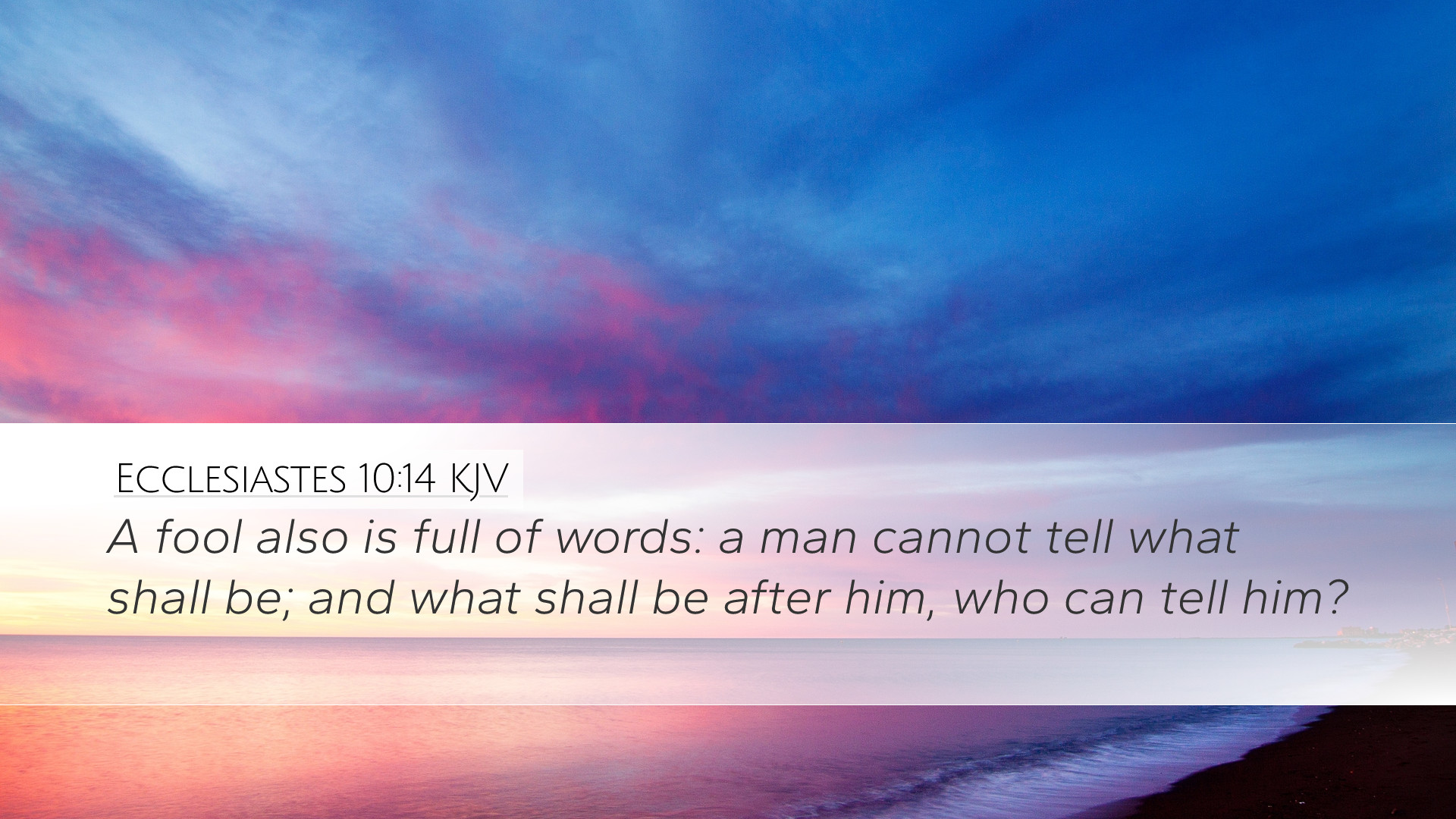Commentary on Ecclesiastes 10:14
Ecclesiastes 10:14: "A fool also is full of words: a man cannot tell what shall be; and what shall be after him, who can tell him?"
Overview
This verse succinctly expresses the nature of foolishness and the limitations of human knowledge. It contrasts the verbose nature of fools with the wisdom of the wise, emphasizing that much speech does not equate to understanding or foresight.
Matthew Henry's Insights
Matthew Henry points out that a fool is characterized by an abundance of words. He notes, “The foolish man is often quick to speak, yet slow to understand the complexities of life.” This speechiness stems from a lack of wisdom and a propensity for self-importance. Henry also emphasizes that the capacity to predict the future is a divine prerogative, reminding readers of the finite nature of human understanding. In this way, the text invites humility among those who often speak without knowledge.
Albert Barnes' Interpretation
Albert Barnes concurs with the assessment that the fool is verbose. He observes, “The fool’s many words arise from his overestimating his own knowledge and insight.” Barnes articulates that despite the fool's proclamations about the future and his own wisdom, he typically lacks the understanding necessary to predict outcomes or the events that follow. This reflects a fundamental misapprehension of reality—highlighting that ignorance is often cloaked in arrogance. Barnes encourages a reflective approach to speech, noting that wisdom is characterized by measured and thoughtful communication.
Adam Clarke's Commentary
Adam Clarke elaborates on the implications of being 'full of words.’ He references the tendency of the foolish to engage in endless talk without substance, stating, “A multitude of words often indicates a lack of knowledge.” Clarke further defines the phrase “a man cannot tell what shall be” as an acknowledgment of human limitations in foresight. He argues that while many may speculate about the future, true understanding is reserved for God alone. Clarke suggests that this conclusion should lead to a greater reliance on divine guidance and wisdom, rather than human presumption.
Theological Implications
In examining this passage, one can see that it reveals fundamental truths about the nature of wisdom and foolishness. The juxtaposition of the fool's extensive speech against the limitations of human insight points to the necessity of divine wisdom in navigating life’s uncertainties. Considerations of the future and one's legacy are laden with unpredictability, underscoring the critical importance of humility and reverence in counsel and conversation.
Practical Application
- For Pastors: This verse serves as a reminder of the importance of discernment in preaching and teaching. Leading with humility in communication is vital.
- For Students: Engage critically with your own speech and the speech of others—seek clarity and understanding rather than just adding to the conversation.
- For Theologians: Emphasize the mystery of God’s knowledge in writings and discussions. Highlighting our human limitations can foster a deeper trust in divine providence.
- For Scholars: Encourage rigorous examination of the texts that deal with wisdom and folly, revealing overarching themes of humility versus arrogance.
Conclusion
Ecclesiastes 10:14 captures the essence of the contrast between foolishness and wisdom. The fool's abundance of words does not equate to understanding or foresight. In an age of information overload, this verse encourages self-reflection on our words and the attitudes we carry as we engage with the world around us. Ultimately, wisdom is rooted in the recognition of our limitations and a reliance on the divine.”


